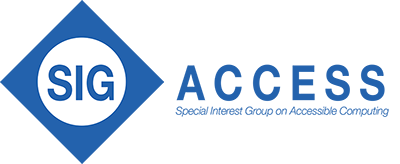
The 22nd International ACM SIGACCESS Conference on Computers and Accessibility was held virtually on October 26-28, 2020. The conference was originally to be held in Athens, Greece, but the pandemic forced it to be virtual. Although the virtual format was somewhat difficult to navigate, it was successful thanks to the great work by the organizers. AccessComputing was well represented among the organizers with AccessComputing Partners Hernisa Kacorri, Treasurer; Jonathan Lazar, Doctoral Consortium Co-Chair; and Raja Kushalnagar, Student Research Competition CoChair, as well as AccessComputing Team Members Larwan Berke, Accessibility Co-Chair; Dhruv Jain, Posters and Demonstrations co-Chair; and Cole Gleason, Proceedings Chair.
There were 395 attendees including 210 students, both record numbers. The average Zoom attendance in each session was over 100. The conference was highly accessible using 13 sign language interpreters (both American and British sign language) and 12 captionists. The Zoom platform was used for the sessions along with Discord for discussion. There were more than 100 Discord channels for the various papers, posters, and demos. Discord also could be used for one-on-one text conversations.
One highlight of the conference was the keynote address at the beginning of the conference by AccessComputing partner representative Jonathan Lazar, the 2014 winner of the AccessComputing Capacity Building Award. His talk, titled “Accessibility Research in the Pandemic Making a Difference in the Quality of Life,” covered many of the issues facing people with disabilities during the COVID-19 pandemic and how the accessibility research committee is responding. His final words were a call to action for the community: “We have the ability to make a huge difference right now! We have the power to save lives. Let’s get to work!”
Of the 57 papers published this year, 20 had at least one author who is an AccessComputing Partner or AccessComputing team member. Of the 67 posters and demos, including those from the Doctoral Consortium and Student Research Competition, 5 had at least one author who is a partner or team member. The Best Student paper was “Living Disability Theory: Reflections on Access, Research, and Design,” with lead author Meagan Hofmann, AccessComputing Team member finishing up her Ph.D. at Carnegie Mellon University, and coauthors Jennifer Mankoff, AccessComputing Partner, Cynthia Bennett, former AccessComputing Team member, now a postdoc, and Devva Kasnitz, a well-known disabilities studies scholar. The paper delineates three themes: ableism in research, oversimplification of disability, and human relationships around disability based on the lived experiences of the four authors and looking through the disabilities studies lens. In the end, they give concrete advice to accessibility researchers that will enable them to pursue research that respects and dignifies the lives of people with disabilities. They advocate building bridges between the accessibility research and disability studies communities.